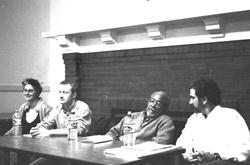

The
Revenge of the Capitalists
BY BILL LASCHER
Imperialism. Colonialism. Extortion. If there are common evils in the
eyes of Oberlin students, these are probably at the top of most Oberlin
students’ lists. Last night, at a teach-in sponsored by the Socialist
Alternative, La Alianza Latina and the African American studies department,
these were dominant themes associated with the nascent Free Trade Area
of the Americas.
 (photo by Areca Treon) |
Organizers of the event are attempting
to raise awareness of what they claim is a corporate assault on democracy
and drum up support for a protest an upcoming meeting on the FTAA. When
they meet in Quebec City, Canada, on April 20-22, trade representatives
from every country in the Western Hemisphere except Cuba, as well as
executives from a number of multinational corporations, hammer out an
agreement on that they claim would eliminate international economic
barriers and create the largest trading bloc in the world.
Associate Professor of Politics Chris Howell, who spoke first, stressed
FTAA’s mysteriousness. “As the FTAA is being constructed very little
is known,” he said. There has been little media attention and no democratic
oversight of the negotiations, he explained.
“We need to be clear that what is being constructed is not a free trade
agreement,” Howell said, expressing a sentiment that was echoed later
by the other speakers, African American Studies Department Chair James
Millette and Carlos Alberto Estrada Salgado, Editor in Chief of the
Mexican newspaper Oposición Socialista. “This is not about free trade,”
Howell said. “It creates legal regimes to allow the free movement of
capital and products, not labor.”
Under the agreement, corporations would have the right to sue any nation
state for any law or policy if it adversely affects the company’s profitability.
Countries which are a party to the agreement would be prevented from
any preferential subsidizing of public services. This policy would mean
that companies have to be given the same access that the state has for
providing public services such as education, correctional facilities
and health care. Opponents claim that allowing corporations this access
could prove destructive to these sorts of services.
“Free trade has never been free,” Millette said. “There has never been
a weak country or constellation of weak countries who supported it,”
he added. Instead, he explained that it was a concept designed by the
British to break open foreign markets and create a dependency on trade
with the empire, such as when it forced China to buy opium.
“Today we are seeing the same thing,” he said, “It is not by chance
that the FTAA is developing as a stepchild of NAFTA.”
He argued that the agreement would not bring benefits to third world
countries which would face massive deregulation and privatization of
their economies. “No developed nation has not had a period of significant
protection of industry,” he said. “What we are facing is that developed
nations are trying to write an ‘end of history.’ It seems they are saying
that we have reached a point that change should not be made.”
Despite painting a dire picture of potential effects of FTAA, all the
speakers had praise for the student movement that began with the December,
1999 protest of the WTO in Seattle and the new chapter that they felt
that opened in student activism. “Opposition to NAFTA was poorly organized
and misdirected,” Salgado said. “Now we’re in a different era. The student
movement in 1999 changed our possibilities.”
![]()
Five Arrested After Barnard Resident Assaulted
Locals to Receive Free Tuition
Bonnor Scholar Director Leaves
Elyria is Your Source for Exotic Fake Nails
Jailed Activists Just Say No to Helicopter Baloney
Funds Go Softly Into the Night